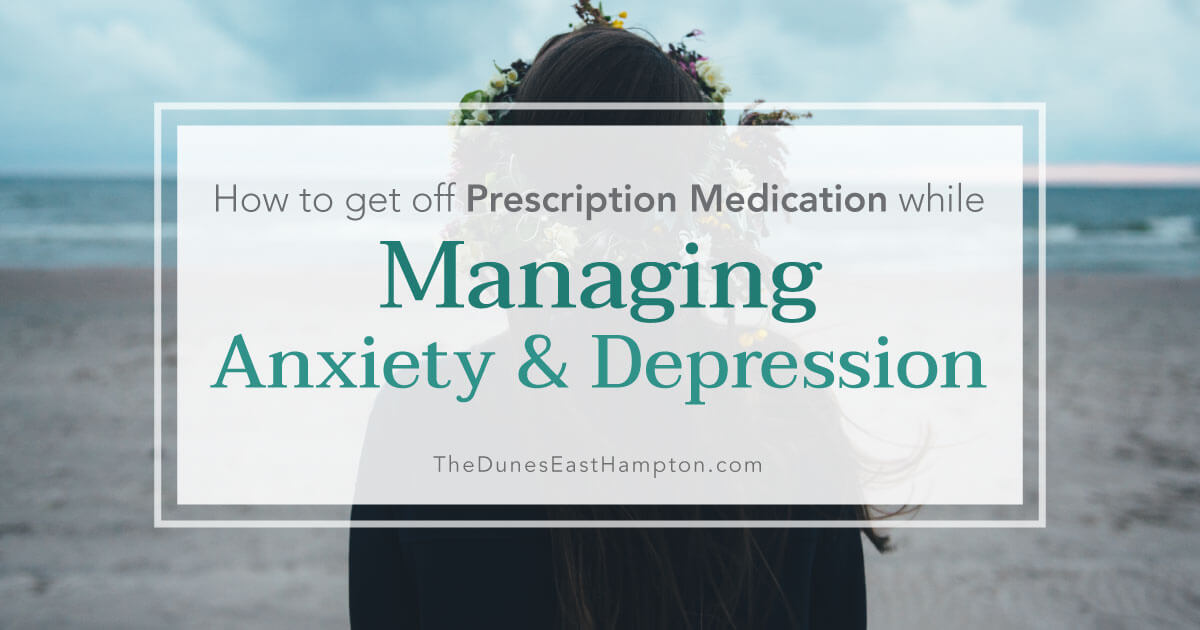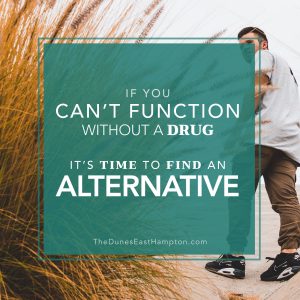
Many Americans, from all walks of life, suffer from mental health disorders such as anxiety, depression, and mood disorders. They may seek out professional treatment, as is wise, but all too often end up becoming addicted to the prescription medications they take to manage their disorder. Or they may self-medicate with drugs or alcohol. Worst of all – they may do both.
Thankfully, there is an alternative. It is possible to get off of addictive prescription medications and other harmful substances and manage the mental illness in a way that is healthy and sustainable in the long term.
At The Dunes East Hampton, we are highly qualified to serve dual diagnosis patients who want to get clean and healthy without sacrificing lifestyle. Our clients come to us because they’re looking for scientifically proven, holistic strategies that will allow them to maintain their active lifestyle now and in the future.
What Is Dual Diagnosis?
 A dual diagnosis is where an individual who has a mental disorder, such as anxiety or depression, also suffers from a substance abuse problem. This is also referred to as having co-occurring disorders.
A dual diagnosis is where an individual who has a mental disorder, such as anxiety or depression, also suffers from a substance abuse problem. This is also referred to as having co-occurring disorders.
In many cases, these two issues create an unhealthy symbiosis – a person with a mental illness may use drugs or alcohol to self-medicate and escape from the negative feelings these issues entail. In turn, substance abuse can exacerbate existing mental health issues and ultimately create new traumas. Some of the mental health issues most commonly seen in dual diagnosis cases can be disastrous if left untreated.
Anxiety Disorders
An anxiety disorder triggers a fight-or-flight reaction in the afflicted individual, causing extreme disruptions in daily life. These people often seek out prescription medication, such as Xanax. Unfortunately, these medications can become addictive if used for more than a short while.
Depression
Many people who suffer from depression turn to the pleasurable feelings drugs produce to treat their symptoms. Unfortunately, doing so is a perfect example of the previously mentioned symbiotic relationship between mental health issues and substance abuse. Once the individual “comes down” from his or her last dose, the withdrawal symptoms invariably make depression symptoms much worse, encouraging the individual to seek another dose of his or her drug of choice.
Post-Traumatic Stress Disorder (PTSD)
PTSD is common among individuals who have experienced or witnessed traumatic events. This condition is very common for combat veterans and sexual assault victims. Most people who have PTSD experience flashbacks, heightened adrenaline levels under stress, and unpredictable mood swings. PTSD is treatable, but unfortunately, many individuals choose drugs and alcohol as an escape.
The Problem With Prescriptions
Many individuals receive prescription medications to combat the symptoms of mental health issues. While this method of treatment often works, it’s important to recognize the inherent dangers of some prescription medications.
Even medications prescribed by a doctor can be dangerously habit-forming or even deadly. In fact, the United States is currently in the grips of a widespread epidemic of drug overdose deaths caused by legal prescription drugs.
Benzodiazepines
Many people with mental health issues take benzodiazepines for mood regulation. Common examples of benzodiazepines include Diazepam, Valium, and Xanax. These drugs are not only habit-forming, but also depress the central nervous system. Doctors prescribe these drugs to treat sleep disorders, anxiety, and panic disorders. Over time, individuals may grow dependent on the calming effects of these medications, and suddenly increasing the dosage can lead to body system failures.
Opioids
Opioid medications, such as OxyContin, Percocet, and Vicodin, are very effective at treating pain, but they are also incredibly addictive. Opioids can cause users to feel cravings after just one or two doses, because they interfere with the brain’s natural system that regulates feelings of pleasure and satisfaction. Over time, individuals will need more and more of the drug to achieve the same feelings, exacerbating their dependency.
Alternatives to Prescriptions
At The Dunes, we want our residents to retake control of their lives from addictive substances. We understand that many mental health issues require regulation, and we help our residents find non-addictive options that work for their unique situations.
We begin by creating a custom-tailored treatment plan for your specific dual diagnosis needs. Our commitment to healing the whole person means you can expect more than simply getting off addictive drugs – we’ll help you develop habits and resources that empower you to return to an active, satisfying lifestyle. To top it all off, the beautiful, luxurious setting of our center allows you to overcome substance abuse in a healing, relaxing environment.
Here in the Hamptons you are family, and will always be treated with dignity and respect, regardless of what ails you.







